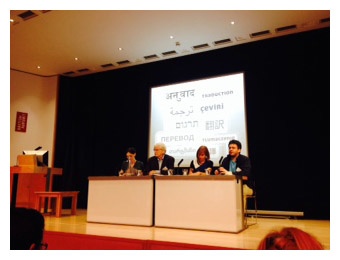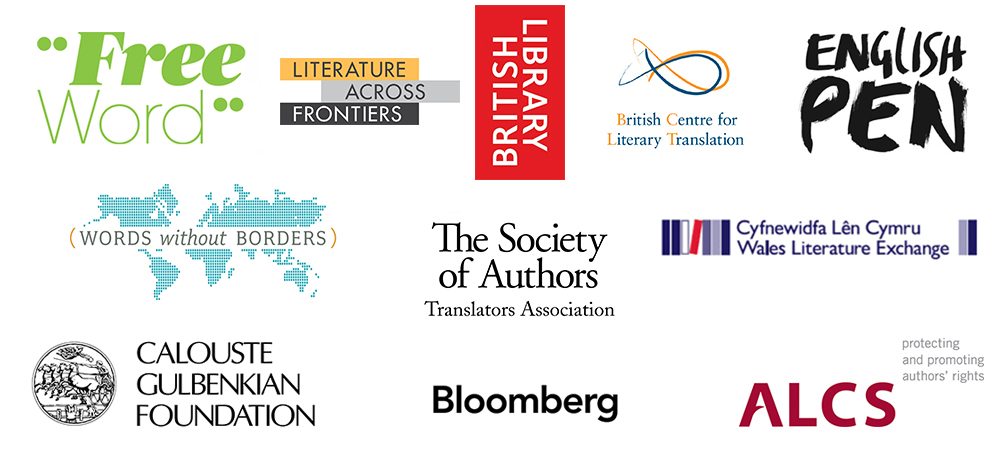International Translation Day is the UK’s annual event for its translation community. Now in its fifth year, it is an opportunity for translators, writers, publishers, students, booksellers, librarians, and critics to gather and debate significant issues, developments in the industry, to network, learn, and exchange ideas. This year it was held in the conference centre at the British Library in London—quite the upgrade from Farringdon’s Free Word Centre—meaning more guests can benefit from the seminars on offer.
The day kicked off with a panel discussion on continuing professional development, chaired by the nervily impatient Jo Glanville, Director of English PEN. On the panel were non-fiction translator Michael Cunningham, who specialises in translating social policy documents; Lucille Desblache, Director of the Centre for Research in Translation and Transcultural Studies at the University of Roehampton; and Daniel Hahn, tireless champion of all things translation-related, newly elected chair of the Society of Authors, and recent translator of Paulo Scott’s wonderful novel Nowhere People (of note: Hahn somehow found the patience to greet a growing queue of acquaintances and admirers after the panel discussion, before dashing off to catch a flight to Dublin).
All members of the panel agreed that the UK translation industry has undergone enormous positive change over the past five years, witnessing a proliferation of funding and training opportunities for (especially literary) translators. These notably include the British Centre for Literary Translation’s prestigious mentorship programme and summer school––not to mention the 128 postgraduate courses in translation at 39 UK institutions. The sheer number of participants in the day’s events is also telling: its partners include Free Word, English PEN, the BCLT, Literature Across Frontiers, the Translators’ Association, Wales Literature Exchange and Words Without Borders, while the Authors’ Licensing and Collecting Society, Bloomberg, The Calouste Gulbenkian Foundation, and the European Commission all offered financial support. This, along with the sheer number of interesting and interested guests, was wonderfully heartening.
I took away a number of important points from the panel discussion. First, for non-literary translators, specialization is key; Michael Cunningham made absolutely clear that translators must have a field of expertise to mark them out from the crowd. Second, a postgraduate qualification is now virtually essential, especially for those pursuing careers in commercial translation. Third, it is important to cultivate a business mind and spend time acquiring good negotiating skills in order to function successfully as a freelancer.
 All excellent advice. The most important insight for literary translators, however, is that theirs has become a multi-tasking profession. This was an issue that was followed up in a number of the seminars, which addressed ways in which translators can also support themselves by writing, editing, proofreading, or translating technical pieces, alongside coveted literary work. These skills make you a better translator and often provide much-needed income between other translation jobs.
All excellent advice. The most important insight for literary translators, however, is that theirs has become a multi-tasking profession. This was an issue that was followed up in a number of the seminars, which addressed ways in which translators can also support themselves by writing, editing, proofreading, or translating technical pieces, alongside coveted literary work. These skills make you a better translator and often provide much-needed income between other translation jobs.
The discussion touched upon the ever-polemical topic of whether translators ought to translate into a language that is not their “mother tongue.” While the prevailing opinion expressed by the panel was “no,” there were clearly a number of dissenters in the audience who weren’t quite given full reign to express their opinions before the chair redirected attention elsewhere. For me, Daniel Hahn’s remark got to the heart of the matter: we must translate only into a language in which we are also capable of being a writer.
The day catered admirably to early career translators, with a session aimed at absolute beginners. Chaired by Rosalind Harvey, founder of the Emerging Translators’ Network (ETN), and Sian Mackie, recent recipient of a BCLT mentorship, the session included some important reality checks as well as bags of genuine enthusiasm for the industry and the opportunities on offer.
A session called “Migrating Languages” was not so much about translation as about the influence of other languages on the literary English of the British Isles. Welsh author Angharad Price, read (in an extraordinary, lilting, high-pitched voice) from her novel The Life of Rebecca Jones, which appeared in English to great acclaim in 2010, translated by Lloyd Jones. Next, Balraj Khanna presented his new novel Indian Magic! (2014), set in an immigrant community in London in the early ’60s. Khanna, it turned out, rather enjoys the sound of his own voice, and proceeded to tell us almost the entire plot of his novel before being judiciously interrupted by the chair, Amanda Hopkinson. Finally, we heard from Valerie Bloom, a Jamaican-British poet whose playful interactive performance piece set in a street market has had me intoning “Fresh CallaLOO” in my head for the past three days.
Other seminars covered translation in the classroom; plans for a prize exclusively awarded to women translators; skills required to translate comics; the translator’s potential role as censor and whether they should “clean up” politically charged or sensitive content; as well as plenty of advice regarding professional development, including workshops on how to pitch a foreign book to a publisher and advice on effective PR and marketing techniques.
Once we’d had our fill of smoked salmon sandwiches and fruit, there were two lunchtime drop-in sessions to attend. The first launched a new resource for emerging translators, the Translators’ Toolkit, inspired and produced by the ETN; the second offered the opportunity to discuss key findings of a report commissioned by BCLT and Free Word, which looked into the challenges and opportunities in funding international literature. The final hour was dedicated to an interactive talk from opera director John Lloyd Davies and music animateur Helen Porter, on translating opera. They discussed whether the translator has a greater duty to musical integrity or strict “dictionary” accuracy; a rather niche interest that was probably of little direct relevance to most translators in the room, but fascinating nevertheless.
The event touched upon an extraordinary range of issues, some of academic interest, others resolutely practical, and is a wonderful resource for those of us working in what can often be a rather isolating profession. I only wish I’d had the opportunity to attend more of the seminars, and I look forward to next year already.
***
Ellen Jones studied English literature and Spanish as an undergraduate and has just completed a Masters in English language at Oxford. Her interests span the written representation and codification of “non-standard” varieties of English, translation, code-switching, and literary multilingualism. She is currently researching a Ph.D. at Queen Mary University of London.
Read more:

